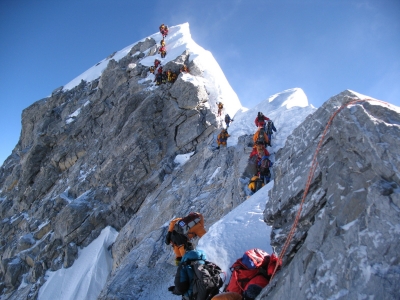
|
As air expands, it becomes cooler. Air in the mountains, where the altitude (height above sea level) is higher, is under less pressure than air at lower altitudes because it is not being so compressed by the air above it. As a result, it expands and makes mountainous areas cold. |
When air expands, it has to push the surrounding air out of its way, which means that it expends part of its energy to do the pushing. As a result, the expanding air cools. When air contracts, it gets pushed into a smaller space by the air around it, which means that energy is put into it, which heats it up. Eventually, the expanding or contracting air will reach the same temperature and pressure as the air surrounding it, and the heating and cooling will stop. Air at higher altitude is under less pressure than air at lower altitude because there is less weight of air above it, so it expands (and cools), while air at lower altitude is under more pressure so it contracts (and heats up).
Air in our atmosphere moves up and down as part of the weather: the sun heats up the ground (which absorbs more light than air and is thus warmer than the air), and the air in contact with the ground heats up, and expands (and then cools). Elsewhere, cooler higher-altitude air sinks, is compressed as it descends, and gets heated as this occurs. This process is called “convection”, and it is responsible for nearly all of our weather.
Credit: UCSB ScienceLine
Picture credit: Google




